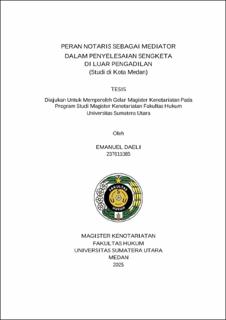| dc.description.abstract | In practice, notaries indirectly act as mediators in their professional duties. Parties seeking notarial services to draft authentic deeds often bring legal disputes, either before or after the deed is created. To ensure legal certainty and enhance public trust, it is crucial to establish regulations on the role of notaries as mediators in out-of-court dispute resolution, including their authority, procedures, costs, implementation mechanisms, and mediator certification training for notaries. This study aims to examine the existence, role, and success of notaries as mediators in out-of-court dispute resolution.
This research employs an empirical legal method (socio-legal approach), using primary data collected through interviews with respondents and informants. Itis a descriptive-analytical study conducted in Medan City. From a population of 222 notaries in Medan, 20% (or 45 notaries) were selected as respondents using probability sampling with a simple random sampling method. In addition to the empirical legal approach, a normative legal approach was also used to obtain secondary data.
The study finds that notaries play an active role as mediators in out-of-court dispute resolution by providing legal counseling. Given the increasing complexity of legal issues faced by society, the role of notaries as mediators has become even more relevant.. The advantages of notaries as mediators include neutrality and trustworthiness, a strong understanding of legal matters and dispute resolution, time efficiency, cost-effectiveness, and the ability to directly formalize mediation results into authentic deeds, such as settlement agreements or peace deeds.
In conclusion, notaries hold a strategic role as mediators in out-of-court dispute resolution. Therefore, it is recommended to establish regulations on the role of notaries as mediators, enhance mediation competencies for notaries, and conductt public outreach and education on the benefits of mediation by notaries. | en_US |


